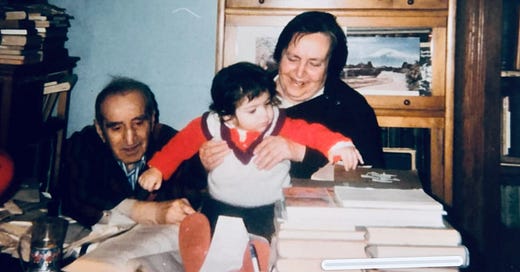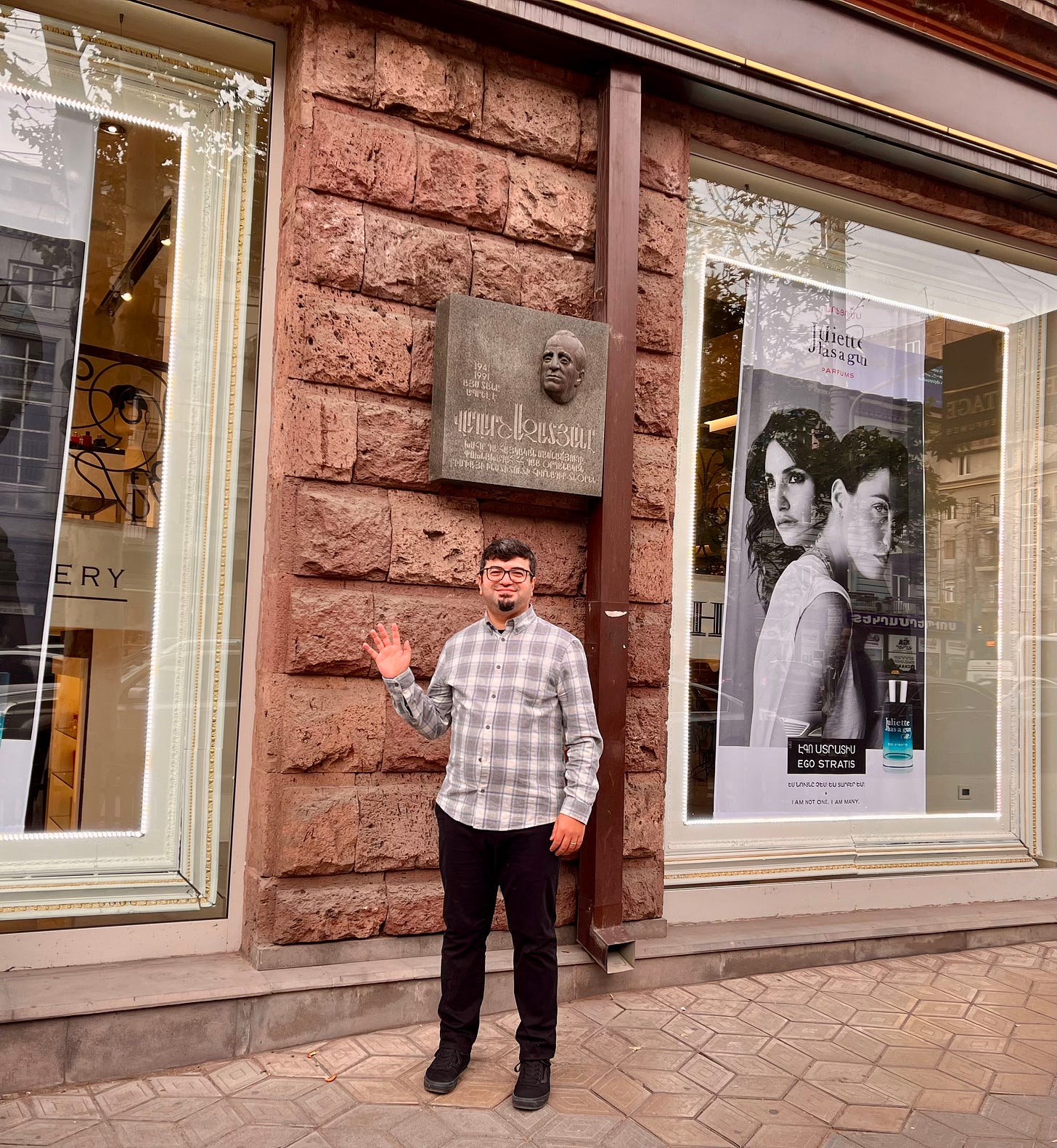In Search of My Grandfather's Library.
If our bodies consist of molecules and atoms, our souls and minds consist of books we’ve read.
My memory carries me back to a certain evening some sixty years ago, to my father’s library in Buenos Aires. I see him; I see the gaslight; I could place my hand on the shelves. I know exactly where to find Burton’s Arabian Nights and Prescott’s Conquest of Peru, though the library exists no longer.
~ from Thought & Poetry by Jorge Luis Borges
If our bodies consist of molecules and atoms, our souls and minds consist of books we’ve read. The Argentinian short-story writer Jorge Luis Borges, who at the end of his life turned blind, said that he could continue to see his father’s library in Buenos Aires though it’s long gone. I’m no great writer, but I know, or better to say - I feel, what Borges tried to convey. Even though 28 years have passed since I last set foot in my grandfather's library at the age of 5, it still flickers in my mind like an old movie reel whenever I close my eyes. Unfortunately, this personal library is also long gone.
Those thousands of books were the molecules of my grandfather’s mind and each page of those volumes was an atom that my grandfather consisted of. I remember the unique smell of those wooden bookshelves, that were assembled meticulously by my great-grandfather David for his son. Every evening, those rows of books which covered the walls like ivy were lit by the light of a kerosene lamp - transforming my grandfather’s library into a cathedral of books.
This was in the 1990s, the Soviet Union had collapsed and my home-country was going through war. The electricity was rationed to just 6 hours a day for every household in Armenia. Back then, you had electricity for three hours in the morning and three hours in the evening. After seven o’clock, the house turned pitch black, leaving you alone with a book in one hand and a kerosene lamp in another. This was the time of the day when the world seemed to have stopped spinning on its axis allowing me to fully focus on my grandfather’s library.
Any book that helps a child to form a habit of reading is good and my grandfather had plenty of them. You could sit in his library and yet explore every corner of the universe. He had books on biology, chemistry, philosophy, physics, history, poetry, taxonomy, languages and every other subject one could imagine. No child could grow up in that house without becoming a passionate reader.
While I sat in the dark, holding a kerosene lamp in one hand and a book in another, I felt as if I was chatting with my grandfather through the pages of his books. Each of those books told a story about him. By reading the notes he made on the margins I could glimpse into the inner working of his mind.
There is a reason why Jorge Luis Borges and Umberto Eco used to compare libraries to labyrinths. By looking at the precious volumes, I was travelling through a labyrinth, and if the lamp in my hand lit up the room so I could read, my grandfather’s books lit up his mind so I could get to know him. It was as if each book revealed something about him. I was unwinding a thread out of a spool and by the end of it I would get to know him well. Through his library, I realised that every personal library tells the biography of its owner.
My grandfather - Vagarsh Azatyan - passed away in 1991, when I was almost two years old. I didn’t get a chance to meet him (in a conscious grown-up way), but I was fortunate to learn about him through the endless rows of books that he assembled throughout his life. A son of a carpenter, he rose to lead the Armenian Academy of Sciences - the British equivalent of leading the Royal Society. He replaced the famous Joseph Orbeli who was appointed as the head of the Hermitage Museum in St. Petersburg (then Leningrad).
I don’t have to skip meals to buy books, whilst my grandfather did. Every book he bought during his teenage years meant that he couldn’t afford to eat for days. I often wonder what he would think if he knew his grandson can buy books without feeling any anxiety about his next meal.
There are things that people who live in the Western world will never be able to imagine or understand - one such thing is the scarcity that existed in the Soviet Union. Scarcity of pretty much everything - clothes, sometimes of certain foods, let alone of books. Even after my grandfather became a prominent scientist, he had to struggle to get most of the books he wanted. Books on pointless communist ideas were easy to get - collected works of Lenin or Stalin, for example - but when it came to books that went beyond ideology, that was when things became hard. You could wait for years (!) to get a book that you and I can get in a small local bookshop today.
Every book we keep on our shelves carries a memory. I can tell you, for example, where, when, and why I bought every book that I have on my shelves. In many of them, I keep receipts to remind myself of the precise date the book joined my library. Each book is a close and silent friend. One saved me during tough times, another supported me when I found myself in a forest dark. I’m infinitely grateful to them, and even if I’ll never get to re-read them again, I find it tough to sell them, let alone throw them away. Perhaps, this is the reason why I, like my grandfather, refuse to borrow books and never got used to the public libraries. You cannot form a solid friendship with a loaned book. You cannot make comments on the margins, remember where you’ve bought it, or pick it up spontaneously from a shelf when you try to remember an idea or quote it contains.
I assembled two libraries throughout my life. The first one lives at my parents’ home in Moscow and the second one is with me in London. If someone will try to compare the former to the latter they will see an evolution of my personality, my beliefs and my principles. The separation between those collections feels as if a part of my personality was surgically removed and kept safely far away till I meet them again. I hope, that one day, those libraries will unite with each other and finally form a coherent whole.
Every now and then, when I enter charity bookshops in England I witness dozens of canvas bags packed with books lying on the floor waiting to be sorted by the staff. Those are often books donated by the grandchildren of a deceased reader, a personal library of a man or a woman, whose books are no longer needed by their descendants. Once forming someone’s mind those books now will dissipate into the hands of future readers. They will never be in the same order, organised in the way they were before they arrived at the charity bookshop.
My grandfather’s library shares the same fate. Unfortunately, it’s the reality that we all should accept, our libraries will one day dissipate and join a library of the next voracious reader. As Lucretius wrote in his philosophical poem De Rerum Natura “nature repairs one thing from another and allows nothing to be born without the aid of another's death.”
I understand that it’s better to grow your own library than to inherit one. But still, I wish my grandfather’s library would have joined mine in its entirety and would enlarge my collection. I wish the volumes he bought and collected so meticulously wouldn’t have dispersed into tiny separate molecules. I wish this as someone who mourns the loss of the library of Alexandria. But, I console myself by remembering that my grandfather gifted me something even more important than a collection physical books - He made me a reader.
I am a reader who will run across the world to buy a book that deserves my attention. Nothing is more pleasant to me than exploring a library. Nowhere else I feel more at home than in a bookshop. It doesn’t matter what storms I’ll have to withstand or what mountains I’ll have to conquer in life, my library and my books will be there to support and guide me.
And the greatest thing is that my children will be readers too.







This felt so personal to read. I never met my grandfather. He passed away long before I was born. But I inherited some of his books. Trigonometry, biographies, first aid manuals from WWII, etc. And I feel they make me feel closer to him or the makeup of his intellectual breadth. He had a library and I rescued as many books as I could to give them a new home with me away from the dilapidated condition they were left in. I feel libraries are genealogical too but in a non-corporal way.
This is the strength of heredity! I am delighted that you are the grandson of Vagharsh Azatyan and hope that one day your wish comes true: that your children will become avid readers like you. Thanks for sharing your thoughts, dear Vashik, I really appreciate them.